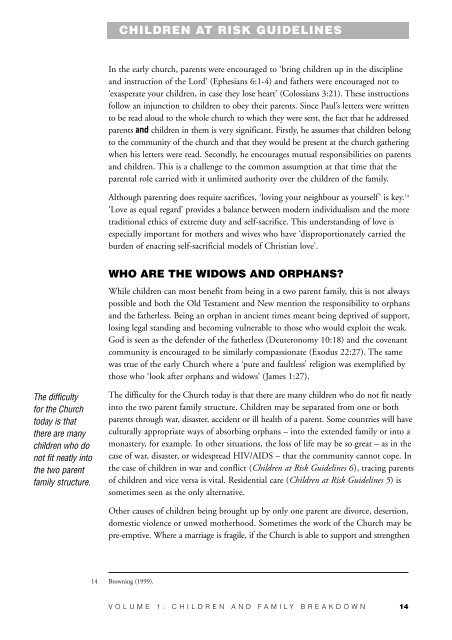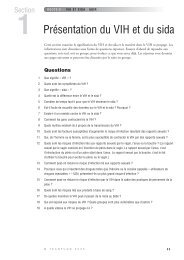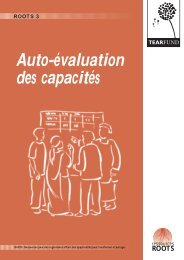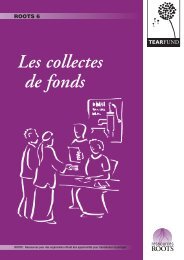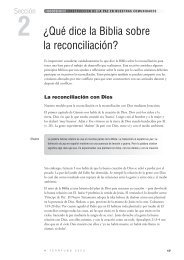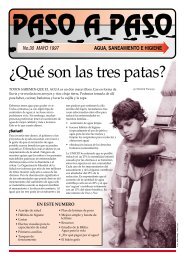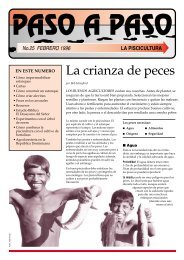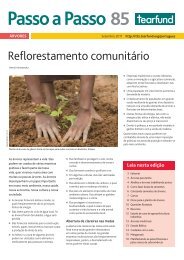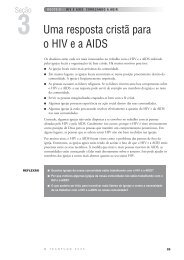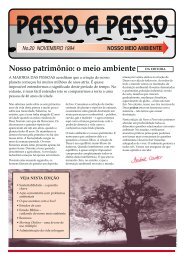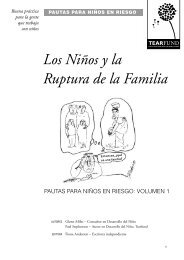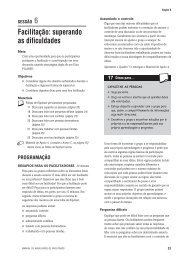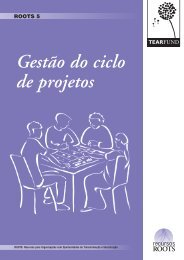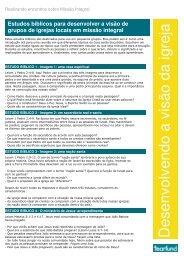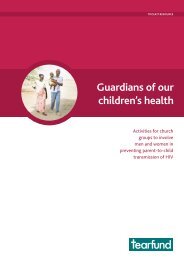Children and Family Breakdown - The Tearfund International ...
Children and Family Breakdown - The Tearfund International ...
Children and Family Breakdown - The Tearfund International ...
Create successful ePaper yourself
Turn your PDF publications into a flip-book with our unique Google optimized e-Paper software.
<strong>The</strong> difficulty<br />
for the Church<br />
today is that<br />
there are many<br />
children who do<br />
not fit neatly into<br />
the two parent<br />
family structure.<br />
CHILDREN AT RISK GUIDELINES<br />
In the early church, parents were encouraged to ‘bring children up in the discipline<br />
<strong>and</strong> instruction of the Lord’ (Ephesians 6:1-4) <strong>and</strong> fathers were encouraged not to<br />
‘exasperate your children, in case they lose heart’ (Colossians 3:21). <strong>The</strong>se instructions<br />
follow an injunction to children to obey their parents. Since Paul’s letters were written<br />
to be read aloud to the whole church to which they were sent, the fact that he addressed<br />
parents <strong>and</strong> children in them is very significant. Firstly, he assumes that children belong<br />
to the community of the church <strong>and</strong> that they would be present at the church gathering<br />
when his letters were read. Secondly, he encourages mutual responsibilities on parents<br />
<strong>and</strong> children. This is a challenge to the common assumption at that time that the<br />
parental role carried with it unlimited authority over the children of the family.<br />
Although parenting does require sacrifices, ‘loving your neighbour as yourself’ is key. 14<br />
‘Love as equal regard’ provides a balance between modern individualism <strong>and</strong> the more<br />
traditional ethics of extreme duty <strong>and</strong> self-sacrifice. This underst<strong>and</strong>ing of love is<br />
especially important for mothers <strong>and</strong> wives who have ‘disproportionately carried the<br />
burden of enacting self-sacrificial models of Christian love’.<br />
WHO ARE THE WIDOWS AND ORPHANS?<br />
While children can most benefit from being in a two parent family, this is not always<br />
possible <strong>and</strong> both the Old Testament <strong>and</strong> New mention the responsibility to orphans<br />
<strong>and</strong> the fatherless. Being an orphan in ancient times meant being deprived of support,<br />
losing legal st<strong>and</strong>ing <strong>and</strong> becoming vulnerable to those who would exploit the weak.<br />
God is seen as the defender of the fatherless (Deuteronomy 10:18) <strong>and</strong> the covenant<br />
community is encouraged to be similarly compassionate (Exodus 22:27). <strong>The</strong> same<br />
was true of the early Church where a ‘pure <strong>and</strong> faultless’ religion was exemplified by<br />
those who ‘look after orphans <strong>and</strong> widows’ (James 1:27).<br />
<strong>The</strong> difficulty for the Church today is that there are many children who do not fit neatly<br />
into the two parent family structure. <strong>Children</strong> may be separated from one or both<br />
parents through war, disaster, accident or ill health of a parent. Some countries will have<br />
culturally appropriate ways of absorbing orphans – into the extended family or into a<br />
monastery, for example. In other situations, the loss of life may be so great – as in the<br />
case of war, disaster, or widespread HIV/AIDS – that the community cannot cope. In<br />
the case of children in war <strong>and</strong> conflict (<strong>Children</strong> at Risk Guidelines 6), tracing parents<br />
of children <strong>and</strong> vice versa is vital. Residential care (<strong>Children</strong> at Risk Guidelines 5) is<br />
sometimes seen as the only alternative.<br />
Other causes of children being brought up by only one parent are divorce, desertion,<br />
domestic violence or unwed motherhood. Sometimes the work of the Church may be<br />
pre-emptive. Where a marriage is fragile, if the Church is able to support <strong>and</strong> strengthen<br />
14 Browning (1999).<br />
VOLUME 1: CHILDREN AND FAMILY BREAKDOWN<br />
14


